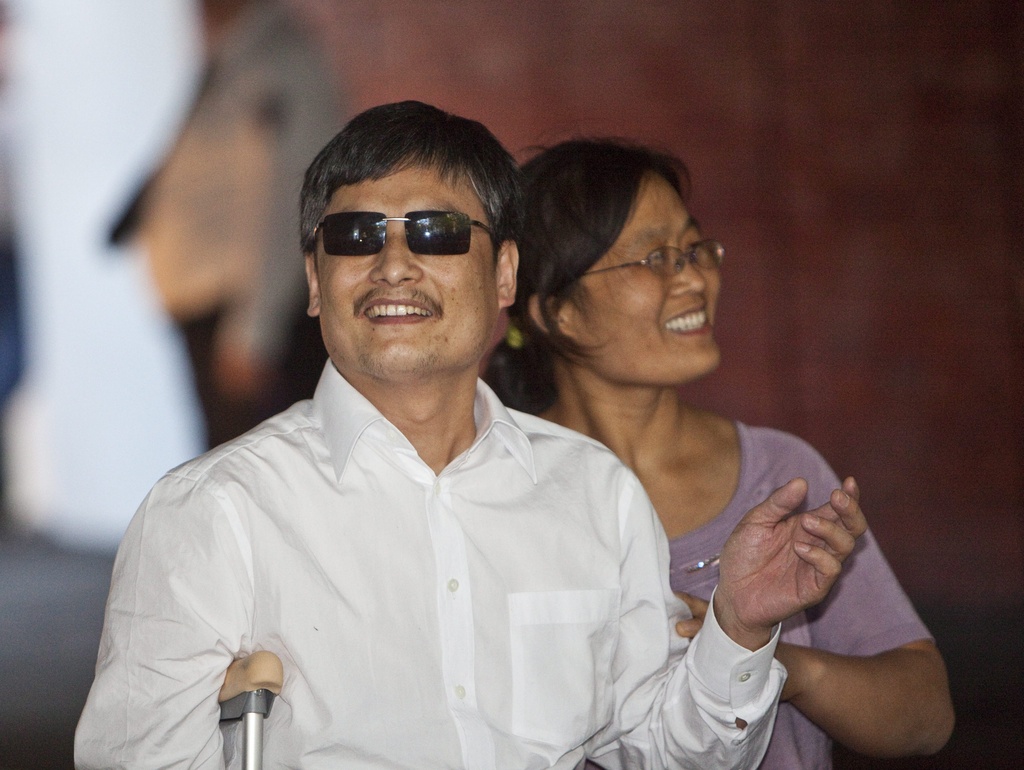Helping torture victims regain their dignity

Tucked away in an unremarkable building at the end of a Bern tram line is the Red Cross Outpatient Clinic for Victims of Torture and War. Within its walls, experts are attempting to turn around the lives of traumatised refugees.
Patients suffer from anxiety, sleeplessness and pain. It usually takes a long time before they can talk about the cruelty they have experienced. They often feel guilt, shame and humiliation about the torture.
Angelika Louis heads the outpatient clinic in Bern, set up by the Swiss Red Cross in 1995. Louis and her team of psychologists, psychiatrists, doctors and welfare specialists open their doors to survivors of torture and war to help them overcome their traumatic experience; to regain their health, self-determination and dignity.
“We cannot undo what has happened, but we can listen and help them come to terms with the horrifying events,” Louis told swissinfo.ch. “Our job is to show them how to integrate their stories into their new lives.”
Victims have to develop individual strategies to cope with everyday life. They need to be well prepared because even inconspicuous events may trigger flashbacks at any time.
Systematic violence
According to the head of the clinic, about a quarter of all refugees, who are granted asylum in Switzerland, were subjected to systematic violence in their home countries. They deeply mistrust any authority.
Governments in 101 nations last year tortured their own citizens, often under the pretext of protecting national security or countering terrorism, according to Patrick Walder, who is responsible for campaigns against torture at the Swiss branch of Amnesty International.
There was a marked increase of documented cases of torture and mistreatment in 2011, Walder stated, adding that systematic violence was often used against people who participated in protests against governments – a worrying recent example being Syria.
“Torture and other cruel, inhuman or degrading acts are always wrong and no circumstances can ever justify them,” Walder told swissinfo.ch.
Torture is not only used by authoritarian regimes. He reproached some countries – including the United States [the Bush administration’s tolerance of use of water-boarding on suspected terrorists] – for having claimed that torture is acceptable under certain circumstances.
Others display a lack of accountability, fail to investigate allegations or simply deny that mistreatment has ever taken place.
Therapists at the outpatient clinics have the difficult task of gaining the trust of refugees who have been mistreated in such environments of violence and mistrust.
Grievously wronged
The therapists first assert that torture is a violation of human rights and that they have been grievously wronged. And, patients are told that surviving torture is a major achievement in itself, said Louis.
In theory, trauma therapy should start once victims are safe, which for refugees would mean they have been granted asylum. The problem is that the Swiss application system is slow. A decision often takes months to years, said Thomas Ihde-Scholl, medical director of psychiatric outpatient services at the FMI hospital in Interlaken.
Ihde-Scholl, whose hospital provides services for three refugee reception centres and one deportation facility, said about eight per cent of his patients are refugees. Many Syrians he has recently seen have experienced torture, while Somalis were often traumatised by war, Ihde-Scholl said.
”Our main focus is to stabilise them, to help them cope,” Ihde-Scholl told swissinfo.ch. “They complain of sleep problems and anxiety, and will not leave the centre without family members or friends.”
Place of hope and fear
He refers some patients to the specialised centre in Bern, but he has a hard time motivating them.
“Bern is far away for someone who cannot leave the house,” Ihde-Scholl explained. “And it is also where legal decisions are taken and therefore a place of hope, but also of fear.”
Post traumatic stress disorder, or PTSD, can be treated quite well, but therapies were developed for westerners, e.g. Vietnam or Gulf War veterans, said Ihde-Scholl, adding that new treatments need to account for different cultures.
One of the main problems is that patients avoid talking about their trauma and anything reminding them of their experience of torture, so the PTSD is often chronic, once therapy starts.
Talking, however, would reduce symptoms and help patients to process trauma, said Julia Müller, a senior researcher at the outpatient clinic at the University Hospital Zurich.
Müller’s team developed a computer-based audiovisual tool for illiterate people. Some patients prefer to answer intimate and intimidating questions about torture or personal reactions to traumatic experiences without therapists and interpreters present, Müller said.
A sense of normality
About half of asylum seekers suffer from psychiatric disorders, mostly depression or PTSD, according to a study by Müller. The children of mentally ill parents with a migration background are themselves also prone to developing mental disease.
Children are greatly affected by trauma, directly or indirectly, Ihde-Scholl said. They sense how their parents feel, the stress and anxieties, but they cannot understand. They often blame themselves, have nightmares, and are afraid to go to sleep. A sense of normality would be very important: Going to school, playing and making friends. That, at least, is the theory.
In practice, the task is tricky. Marion Walting, a remedial teacher, who integrates refugee children into regular classes in Thun, is working with a 12-year-old Tibetan girl. For the first three years, the girl was simply unresponsive.
“How do you help a traumatised child who has never learned to trust? All we can try and do is convince them that nobody wants to harm them and that they are finally safe,” Walting said. “You cannot erase their memories, but you can help them see a positive future so that these memories will eventually fade.”
There are Red Cross Outpatient Clinics for Victims of Torture and War in Bern, Zurich, Geneva and Lausanne. Since their inception, they have treated more than 6,500 victims of torture and war.
Most patients were asylum seekers, between 36 and 45 years old; about two-thirds were men. The clinics have also started to offer specialised therapies for children and adolescents.
Almost half of the 653 patients treated last year were waiting for a final decision on asylum. They mainly came from Turkey, the Middle East, Eastern Europe, Asia and Africa.
The clinics have psychologists, psychotherapists, psychiatrists, doctors, and welfare specialists, supported by translators in over 20 languages.
The outpatient clinics work like any doctor’s office. Patients are primarily referred by their general practitioners, and health insurers reimburse the consultations.
In 2011, almost half of the funds of the clinic in Bern came from the Swiss Red Cross, a fifth from insurers, 16% from government, 2% from the United Nations and 12% was donated.

In compliance with the JTI standards
More: SWI swissinfo.ch certified by the Journalism Trust Initiative














You can find an overview of ongoing debates with our journalists here . Please join us!
If you want to start a conversation about a topic raised in this article or want to report factual errors, email us at english@swissinfo.ch.